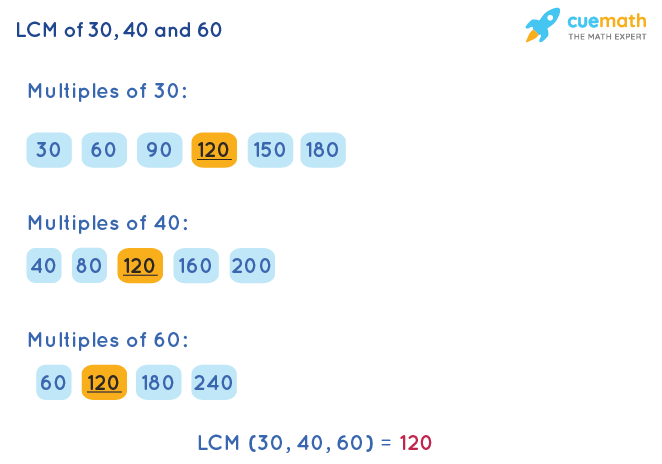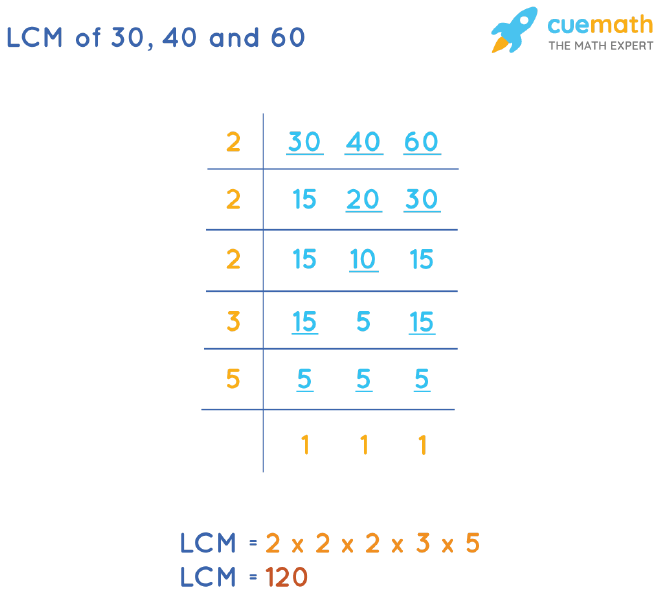LCM of 30, 40, and 60
LCM of 30, 40, and 60 is the smallest number among all common multiples of 30, 40, and 60. The first few multiples of 30, 40, and 60 are (30, 60, 90, 120, 150 . . .), (40, 80, 120, 160, 200 . . .), and (60, 120, 180, 240, 300 . . .) respectively. There are 3 commonly used methods to find LCM of 30, 40, 60 - by prime factorization, by division method, and by listing multiples.
| 1. | LCM of 30, 40, and 60 |
| 2. | List of Methods |
| 3. | Solved Examples |
| 4. | FAQs |
What is the LCM of 30, 40, and 60?
Answer: LCM of 30, 40, and 60 is 120.

Explanation:
The LCM of three non-zero integers, a(30), b(40), and c(60), is the smallest positive integer m(120) that is divisible by a(30), b(40), and c(60) without any remainder.
Methods to Find LCM of 30, 40, and 60
The methods to find the LCM of 30, 40, and 60 are explained below.
- By Listing Multiples
- By Division Method
- By Prime Factorization Method
LCM of 30, 40, and 60 by Listing Multiples

To calculate the LCM of 30, 40, 60 by listing out the common multiples, we can follow the given below steps:
- Step 1: List a few multiples of 30 (30, 60, 90, 120, 150 . . .), 40 (40, 80, 120, 160, 200 . . .), and 60 (60, 120, 180, 240, 300 . . .).
- Step 2: The common multiples from the multiples of 30, 40, and 60 are 120, 240, . . .
- Step 3: The smallest common multiple of 30, 40, and 60 is 120.
∴ The least common multiple of 30, 40, and 60 = 120.
LCM of 30, 40, and 60 by Division Method

To calculate the LCM of 30, 40, and 60 by the division method, we will divide the numbers(30, 40, 60) by their prime factors (preferably common). The product of these divisors gives the LCM of 30, 40, and 60.
- Step 1: Find the smallest prime number that is a factor of at least one of the numbers, 30, 40, and 60. Write this prime number(2) on the left of the given numbers(30, 40, and 60), separated as per the ladder arrangement.
- Step 2: If any of the given numbers (30, 40, 60) is a multiple of 2, divide it by 2 and write the quotient below it. Bring down any number that is not divisible by the prime number.
- Step 3: Continue the steps until only 1s are left in the last row.
The LCM of 30, 40, and 60 is the product of all prime numbers on the left, i.e. LCM(30, 40, 60) by division method = 2 × 2 × 2 × 3 × 5 = 120.
LCM of 30, 40, and 60 by Prime Factorization
Prime factorization of 30, 40, and 60 is (2 × 3 × 5) = 21 × 31 × 51, (2 × 2 × 2 × 5) = 23 × 51, and (2 × 2 × 3 × 5) = 22 × 31 × 51 respectively. LCM of 30, 40, and 60 can be obtained by multiplying prime factors raised to their respective highest power, i.e. 23 × 31 × 51 = 120.
Hence, the LCM of 30, 40, and 60 by prime factorization is 120.
☛ Also Check:
- LCM of 4 and 16 - 16
- LCM of 14 and 28 - 28
- LCM of 60 and 72 - 360
- LCM of 15 and 21 - 105
- LCM of 26 and 169 - 338
- LCM of 7 and 11 - 77
- LCM of 27 and 63 - 189
LCM of 30, 40, and 60 Examples
-
Example 1: Verify the relationship between the GCD and LCM of 30, 40, and 60.
Solution:
The relation between GCD and LCM of 30, 40, and 60 is given as,
LCM(30, 40, 60) = [(30 × 40 × 60) × GCD(30, 40, 60)]/[GCD(30, 40) × GCD(40, 60) × GCD(30, 60)]
⇒ Prime factorization of 30, 40 and 60:- 30 = 21 × 31 × 51
- 40 = 23 × 51
- 60 = 22 × 31 × 51
∴ GCD of (30, 40), (40, 60), (30, 60) and (30, 40, 60) = 10, 20, 30 and 10 respectively.
Now, LHS = LCM(30, 40, 60) = 120.
And, RHS = [(30 × 40 × 60) × GCD(30, 40, 60)]/[GCD(30, 40) × GCD(40, 60) × GCD(30, 60)] = [(72000) × 10]/[10 × 20 × 30] = 120
LHS = RHS = 120.
Hence verified. -
Example 2: Calculate the LCM of 30, 40, and 60 using the GCD of the given numbers.
Solution:
Prime factorization of 30, 40, 60:
- 30 = 21 × 31 × 51
- 40 = 23 × 51
- 60 = 22 × 31 × 51
Therefore, GCD(30, 40) = 10, GCD(40, 60) = 20, GCD(30, 60) = 30, GCD(30, 40, 60) = 10
We know,
LCM(30, 40, 60) = [(30 × 40 × 60) × GCD(30, 40, 60)]/[GCD(30, 40) × GCD(40, 60) × GCD(30, 60)]
LCM(30, 40, 60) = (72000 × 10)/(10 × 20 × 30) = 120
⇒LCM(30, 40, 60) = 120 -
Example 3: Find the smallest number that is divisible by 30, 40, 60 exactly.
Solution:
The smallest number that is divisible by 30, 40, and 60 exactly is their LCM.
⇒ Multiples of 30, 40, and 60:- Multiples of 30 = 30, 60, 90, 120, 150, 180, 210, . . . .
- Multiples of 40 = 40, 80, 120, 160, 200, 240, 280, . . . .
- Multiples of 60 = 60, 120, 180, 240, 300, 360, 420, . . . .
Therefore, the LCM of 30, 40, and 60 is 120.

FAQs on LCM of 30, 40, and 60
What is the LCM of 30, 40, and 60?
The LCM of 30, 40, and 60 is 120. To find the LCM (least common multiple) of 30, 40, and 60, we need to find the multiples of 30, 40, and 60 (multiples of 30 = 30, 60, 90 . . . .; multiples of 40 = 40, 80, 120 . . . .; multiples of 60 = 60, 120, 180 . . . .) and choose the smallest multiple that is exactly divisible by 30, 40, and 60, i.e., 120.
Which of the following is the LCM of 30, 40, and 60? 27, 120, 40, 45
The value of LCM of 30, 40, 60 is the smallest common multiple of 30, 40, and 60. The number satisfying the given condition is 120.
What is the Relation Between GCF and LCM of 30, 40, 60?
The following equation can be used to express the relation between GCF and LCM of 30, 40, 60, i.e. LCM(30, 40, 60) = [(30 × 40 × 60) × GCF(30, 40, 60)]/[GCF(30, 40) × GCF(40, 60) × GCF(30, 60)].
What is the Least Perfect Square Divisible by 30, 40, and 60?
The least number divisible by 30, 40, and 60 = LCM(30, 40, 60)
LCM of 30, 40, and 60 = 2 × 2 × 2 × 3 × 5 [Incomplete pair(s): 2, 3, 5]
⇒ Least perfect square divisible by each 30, 40, and 60 = LCM(30, 40, 60) × 2 × 3 × 5 = 3600 [Square root of 3600 = √3600 = ±60]
Therefore, 3600 is the required number.
visual curriculum